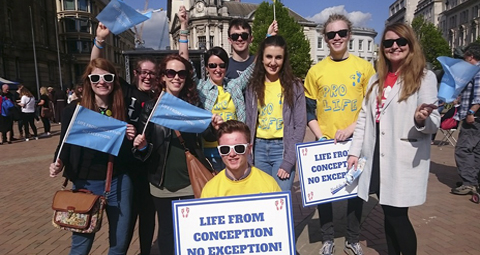May 20 | ![]() 0 COMMENTS
0 COMMENTS ![]() print
print

Opposing abortion should not mean shutting anyone out
— Whether engaging in vigorous debate with political parties or reaching out to women in distress, pro-life activists should hold firm to their principles and let their compassion shine through, JOHN DEIGHAN of SPUC Scotland reports
The recent parliamentary election has a new significance. The newly passed Scotland Act makes abortion law a power of the Scottish Parliament and so the views of MSPs on this subject are very important. Following the launch of the ‘Don’t Stop a Beating Heart’ campaign key political leaders, notably including First Minister Nicola Sturgeon, stated that they would not change the law on abortion.
This is at least a barrier to those who are determined to make abortion even more easily available. But unfortunately there is a determined core of people in our society who, for whatever reason, are grimly determined to expand the destruction of human life in the womb. Their influence cannot be ignored. For example, it has led to the Royal College of Midwives giving their support to proposals for abortion to birth to be legalised.
It is important to realise what a determined minority can achieve. Democracy works in such a way that those who are on the front foot in proposing legal change can eventually move step by step to their goal. Those who participate are the ones who will spread the ideas for good or for bad through the whole political system.
That is why we cannot ignore the fact that the Green party has embedded in its policies very radical abortion proposals. “We will push for abortion to be removed from the criminal justice system,” the party asserts in its manifesto, which means that unborn children will lose any legal protection against the taking of their lives.
Political life in Scotland is undergoing a seismic shift. In a pattern seen around the world, people are becoming disillusioned with politics as it fails to live up to the hopes invested in it. In Scotland our desire for change has resulted in a desertion from the Labour party. It must be hard for many of the stalwarts of Labour to understand the speed of their demise and now many even question whether they can be a force in Scotland again. We shouldn’t lose hope that a sudden change could also occur in support of life.
The big winner is, as we all know, the Scottish National Party, as it becomes the new establishment. But our voting system allows minority groups to make breakthroughs as well and the Greens have benefitted from this. Their brand is one that is favourably covered in all walks of life. Everybody wants to be Green. Nothing seems as inoffensive as being Green. Who doesn’t want to look after trees, the environment and wildlife?
Schools across Scotland have put great effort into pushing a ‘Green Revolution’. Thus young people in their idealism have largely absorbed the notion that Green is an unalloyed good. It is routine for Scottish schools, including Catholic ones, to put great effort into gaining a Green Flag for their schools. Unsurprisingly, then, when an election ballot paper has a Green party option it has a considerable attraction. Many who give their support will be unaware that the party has such dangerous views on the right to life and religious freedom (they want to ban Catholic schools as well).
The lesson for those who want to see political parties holding to ideas that promote a better society is that they need to be more involved. So often it is the small organisations like the Green Party that most easily succumb to the ideas of very few people. We have less justification in complaining about what political parties do if we refuse to take the opportunities available to influence them. Democracy needs widespread participation by people. Most of us can do some small amount even if it is emailing a candidate or writing to a party, expressing our views, when they look for voter input.
It is for that reason that the Bishops of Scotland called on Catholics to be more involved in politics. That also comes with a need to be informed on the Church’s social teaching. This doesn’t prescribe political solutions but it provides the principles of right and wrong that must be adhered to by all people who want to act justly. Sadly, I know from experience that many who genuinely claim to be Catholics in parties still happily support legal abortion. That is a challenge that needs to be faced. An effort to instil a firm understanding of the Church’s teaching in families, schools, parishes and wider society is needed.
If the Green movement can take such a high profile in public consciousness then so can the importance of human life, provided we show the same determination to promote a good idea as they do a bad one.
ARCH
Amid our pro-life activism, it is always important to be perceptive to those who may be post-abortive. I think most of us manage this well, but I understand how it feels to think “I don’t know the right thing to say” or “How can I help this person?” I think the right answer is to simplify it. Among the complications that surround any abortion, there is also a simplicity in how we can help. Most importantly, be yourself and be a friend. Your greatest asset is to care for this person and let the compassion that you already have shine through.
Certainly a concern I had when I took up my unique role of working for both Abortion Recovery Care and Helpline (ARCH) and the Society for the Protection of Unborn Children (SPUC) was “How much can I mix my activism with the abortion-recovery side of my work, and will I be putting off people seeking help?” I thought hard about that. But then someone reminded me that if a person is filled with pain inside then the trigger is within them and that can be set off by anything in everyday life: what they see on TV; what they hear on the radio; what they see walking down the street.
For them to see pro-lifers may just be another reminder of their pain—one among many others. So it’s also important, if you come across an angry person, to keep in mind that they may be hurting because of an abortion decision. Think now about how you can reinforce the idea that, although you disagree with the act of abortion, you do not condemn anyone for having one, as there are many difficult circumstances that may have led them to that decision. It’s important to bear in mind that we are going to encounter people in our day-to-day lives who have had an abortion.
There’s a whole army of folk out there—mainly women, but men, too—who are so riddled with sorrow, grief, pain and regret that they genuinely believe themselves to be beyond the limits of mercy, beyond help. They are a silent army; they live and move among us; they sit very close to us but because of an impenetrable wall of silence, they are also light years apart from us. The woman who has experienced abortion so wraps herself in silence that she is stuck in a fortress. She’s silent because, no matter how many people were involved in the decision to abort, it was she, and she alone, who gave her signed consent. This was her doing and as far as she’s concerned, the pain or the numbness she feels are no more than she deserves. She’s silent because the baby she knows she was carrying is no longer around to feel or think anything. What right has she, then, to look for healing and mercy? She is silent because she is terrified that the people she loves will reject her and not love her any more. She grieves the death of her child and no-one comes up to her to console or offer condolences. So what can we do?
If she tells you, cry with her. Offer her hope. And there is hope. This is a wound that can be healed. We’re not here to condemn, we’re here to recognise the pain she’s feeling and understand that and to be with her through that. Know the details of post-abortion recovery organisations like ARCH and maybe lead her towards Rachel’s Vineyard—a post-abortion recovery retreat for both men and women. They are not alone and they don’t have to go through this alone.
If you or anyone you know has been hurt by abortion, call ARCH today on 0845 603 8501. The helpline is available Monday-Friday during office hours and every night of the year from 7-10pm. Calls are charged at local rates.
March for Life
On Saturday May 14 it was an early start for the Scottish contingent heading to the March for Life in Birmingham. It was an 18-plus hour day, but well worth the trip. What strikes you is the fun and joy that everyone radiates.
One person who noticed the joy was a young woman in crisis pregnancy who, while walking through Birmingham last year, came across the March for Life and was struck by how joyous people were. She noticed a banner that made her think about the abortion she was just about to have. After seeking help she cancelled her abortion. She stood on the stage this year, holding her wee boy and thanking the crowd for their witness, which led her to choose life for her baby. This is one of the many reasons why we march. It was so moving to hear her speak and see how thankful she was for the life of her baby.
The march itself had a real buzz to it. Thousands walking through the streets, singing and dancing and loving life. Of course, there was some opposition but undecided onlookers could see who the aggressive side were straight away.
After the events of the day, some of our young folk spoke to Stephanie Gray, one of the speakers, who was very excited to meet us as her dad is from Glasgow. We had a good chat with her and sampled her Scottish accent before climbing back aboard our bus home.
—John Deighan is director of SPUC Scotland











